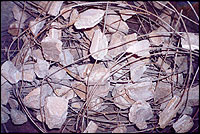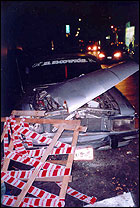Líneas de investigación
Proyectos en Curso
Proyectos Anteriores
 Luchas autónomas en el Estado español 1970-1977
Luchas autónomas en el Estado español 1970-1977  Working class autonomy. A political intervention on memory
Working class autonomy. A political intervention on memory
Working class autonomy. A political intervention on memory |
|
Date: 27 >> 31 october 2008
PRESENTATIONPRESENTATION
This project does not wish to recover our historical memory which, on many occasions, results in only justifying the present. Our reading of history will be done from today’s perspective. It is interesting for us to understand our reality, that is to say, the sources of its conflicts, the origin of social discontent… and if we place defeat at the centre of the debate it is merely to better appreciate our own situation. The precariousness of working life, capitalism running out of control… these facts can not be understood without bearing in mind the fact that this other movement was destroyed. However, we do not wish to project a nostalgic attitude. For this reason, this project hopes to be in itself a complex form of agitation and not become an object of cultural consumption. We know it is easy to claim these things but that is our real aim. To carry out this project, Espai en Blanc have co-ordinated a group of historians and video-artists who have militant conception of their own work. This has been necessary to escape from academicism. Thanks to them we have been able to carry out research in archives and many interviews in different Spanish cities. All this came together in collective debate on “Autonomy: A present-day concept?” which is included in the book’s conclusion. This process of research and discussion is just the beginning, since now the real work begins in the widening and dissemination of this archive. Only in this way can we begin to refer to a real political intervention on memory. The project consists of three central ideas:
- The digital web archive www.luchasautonomas.net , which brings together digitalized documents and journals from the time.
The digital web archive www.luchasautonomas.net includes digitalized documents and period journals. The documentation originates, in great part, from a clandestine archive compiled in Barcelona in 1965 by different members of the working class autonomy movement. This documentation was deposited in the International Institute of Social History in Amsterdam (IISG), within the collection of the Ruedo Ibérico publishing house which bought the archive at the end of the seventies. These are documents written in the militants’ own hands. Apart from the organizations’ internal documentation, which includes initial reflections on working class autonomy, the archive also contains documentation on strikes, neighbourhood struggles, left-wing organizations and reports of different uprisings from the whole country, as well as bulletins and magazines. The documentation included in our digital archive is divided into three sections: experiences, organizations and publications. There are also itineraries based on concepts which guide visitors around the website. The documents are presented in two formats: PDF files which preserve the documents’ original presentation which can be read and allow for searches and TXT format files which do not preserve the presentation but are more legible and can be copied and pasted more easily. The PDF version represents the document itself; the TXT format only the text of each document. The aim is to carry on completing this archive, which in the first place is based around Catalunya and then widen it geographically to the rest of the Spanish state.
The technical team formed by Chema Falconetti (collaborator with J. Jordà and author of videos among which are El forat de la vergonya [The Hole of Shame], Pepe Rovira (main character in the film El taxista ful) and Óscar de Gispert have filmed the documentary in close collaboration with a group of historians. Interviews have been recorded with Clemente (Roca factory strike), Marcelo (founder of the first Comisiones Obreras), Paco (port worker in Barcelona) and Jesús (instigator of the Vitoria uprising), a group of teachers from “Schools in the Struggle”, and militants from independent working groups in Catalonia and Andalusia. The documentary attempts to bring together the voices of some of the key people involved in these struggles, but above all it wishes to reflect the collective strength that lay behind each of them. The result is also a radical critique of Spain’s democratic transition.
This book attempts to shed light on some of the independent struggles that took place during the Franco regime and the democratic transition. Reference is made to different strikes (e.g. in Granada’s construction industry, the Roca factory or amongst Barcelona port workers…) as well as riots amongst social prisoners and counterculture movements. However, this is not purely an historical reconstruction. Together with these moments, the book attempts to reflect on the political changes which have changed our understanding of the defence of autonomy, considering that we have moved from thinking of workers’ rights to the rights of the self. To get a deeper understanding of this, the book takes into account a debate with members of the Andalusian Country Workers' Trade Union-SOC as well as references to Mexico and Argentina, where independent action and uprisings have taken place more recently. Workers’ autonomy was, more than anything, a form of uprising that foreshadowed another kind of society. Today, in a global and post-political era, rethinking this autonomy is to initiate a way of breaking down order, opening up cracks in the reality that has shaped our experience. Espai en blanc is a collective desire on the part of those who wish to make the thought process a passionate endeavour. In other words, open up a hole in the reality which is defined not by what one knows but rather by what one does not know. This hole opens up a breach between activism and academe, discourse and action, ideas and experimentation. For this reason, it is an option which is both philosophical and political.
_________________________
PROGRAMMEPROGRAMME
>>>>>>>>>>>>>>>>>>>>>>>>>>>>>>>>>>>>>>>>>>>>>>>>>>>>>>>>>>>>>>>>>>
|

 Autonomía obrera. Una intervención sobre la memoria [Working class autonomy. A political intervention on memory] brings together the results [Digital Archive / Book / Documentary] of Luchas autónomas en el Estado español 1970-1977 [Working struggles in the Spanish State 1970-1977], a research project from the Fundación Espai en Blanc
Autonomía obrera. Una intervención sobre la memoria [Working class autonomy. A political intervention on memory] brings together the results [Digital Archive / Book / Documentary] of Luchas autónomas en el Estado español 1970-1977 [Working struggles in the Spanish State 1970-1977], a research project from the Fundación Espai en Blanc SEVILLE
SEVILLE